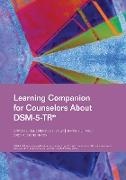Read more
This updated learning companion is designed to assist professional counselors with a smooth transition from the DSM-5 to the DSM-5-TR. The text highlights diagnostic changes and new developments within the DSM-5-TR. Each chapter features updated research with implications for evidence-based practice alongside practical strategies for holistic, culturally-responsive, and wellness-based counseling. As with the original DSM-5 Learning Companion for Counselors, this revision is intended for counselors, counseling students, counselor educators, and mental health professionals who engage in mental health diagnosis and evidenced-based services. The DSM-5-TR includes some important changes of which counselors must be aware, and this updated learning companion will help them incorporate these changes into practice. This new edition addresses these noteworthy changes specifically, delineating the differences and guidance, as well as case examples.
DSM-5-TR is a registered trademark of the American Psychiatric Association. This book is neither endorsed by nor a product of the American Psychiatric Association.
List of contents
Chapter 1 : Introduction and Overview
Chapter 2 : Structural and Philosophical Changes to the DSM : A Historical Overview
Introduction to Diagnostic Changes
Part One to Part Four Overview
Part One : Clinical Utility and Practice Implications for Counselors
Part One : Introduction
Chapter 3 : Sociocultural Issues in Diagnosis in the DSM-5-TR
Chapter 4 : Culturally Responsive Case Conceptualization and Treatment Planning : Cultural Formulation
Chapter 5 : Practice Implications for Counselors
Part Two : Changes and Implications Involving Mood, Anxiety, and Stressor-Related Concerns
Part Two : Introduction
Chapter 6 : Depressive Disorders
Chapter 7 : Bipolar and Related Disorders
Chapter 8 : Anxiety Disorders 1
Chapter 9 : Obsessive-Compulsive and Related Disorders
Chapter 10 : Trauma- and Stressor-Related Disorders
Chapter 11 : Gender Dysphoria in Children, Adolescents, and Adults
Part Three : Changes and Implications Involving Addictive, Impulse-Control, and Specific Behavior-Related Concerns
Part Three : Introduction
Chapter 12 : Substance-Related and Addictive Disorders
Chapter 13 : Disruptive, Impulse-Control, and Conduct Disorders
Chapter 14 : Personality Disorders
Chapter 15 : Specific Behavioral Disruptions
Part Four : Changes and Implications Involving Diagnoses Commonly Made by Other Professionals
Part Four : Introduction
Chapter 16 : Neurodevelopmental and Neurocognitive Disorders
Chapter 17 : Schizophrenia Spectrum and Other Psychotic Disorders
Chapter 18 : Dissociative Disorders
Chapter 19 : Somatic Symptom and Related Disorders
About the author
Carman S. Gill, PhD, LPC, NCC, ACS, is a professor and department chair at Florida Atlantic University. She has worked with client populations including individuals who are dually diagnosed, individuals with chronic mental illness, children, and individuals experiencing acute mental health crises. Her research focus includes wellness and women’s issues, as well as spirituality and religion in counseling. Dr. Gill is a past-president of ASERVIC and has served that organization as conference cochair twice, as well as newsletter editor, member of the board of directors, and secretary. Dr. Gill has coauthored multiple peer-reviewed journal articles on spiritual topics. She has coedited a book on spirituality and religion in counseling, in addition to the previous version of this Learning Companion.

